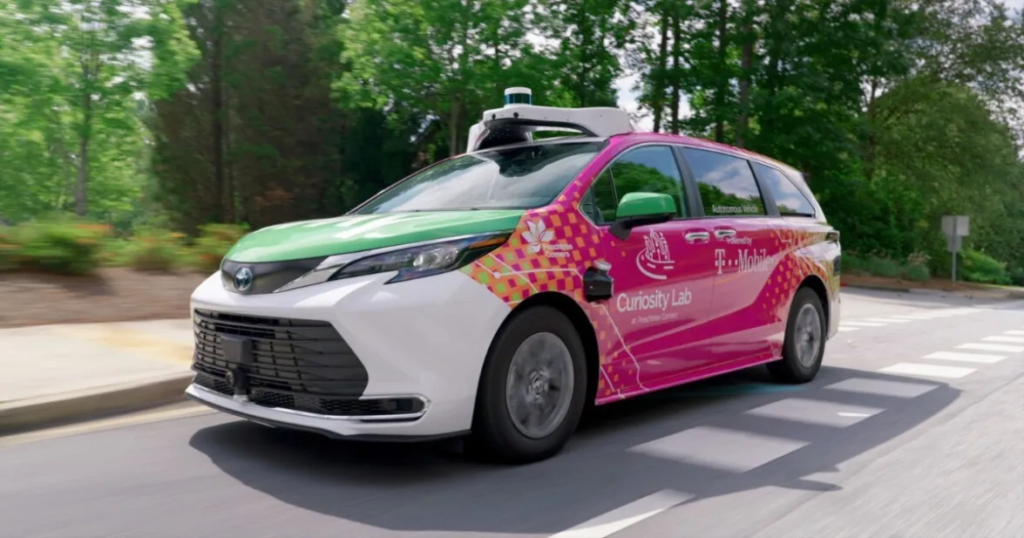Autonomous vehicles are no longer a futuristic concept—they’re here, and companies like May Mobility are leading the charge. But unlike its competitors, May Mobility is taking a unique approach to commercialization. Instead of focusing on individual ride-hailing services, the company is deploying autonomous shuttles for on-demand and pooled rides within controlled environments like campuses and designated routes.
This strategy, which May Mobility calls a “gentle on-ramp” approach, is already showing promise. Recently, the startup launched its first fully driverless commercial service in Peachtree Corners, Georgia, marking a significant milestone in the autonomous vehicle industry.
In this article, we’ll explore May Mobility’s innovative approach, its latest deployment in Peachtree Corners, and what this means for the future of autonomous transportation.
What is May Mobility?
May Mobility is a Michigan-based startup specializing in autonomous vehicle technology. Founded in 2017, the company has set itself apart by focusing on microtransit solutions—autonomous shuttles that operate within specific zones, such as corporate campuses, retirement communities, and urban centers.
Key Features of May Mobility’s Approach:
- On-Demand Shuttles: Riders can book trips via an app, similar to ride-hailing services.
- Pooled Rides: Multiple passengers can share a single vehicle, reducing costs and environmental impact.
- Controlled Environments: May Mobility operates in areas with predictable traffic patterns, such as campuses and designated AV routes.
The Peachtree Corners Deployment: A Milestone for Autonomous Mobility
Peachtree Corners, a tech-centric city in the Atlanta metropolitan area, is now home to May Mobility’s first fully driverless commercial service. This deployment is a significant step forward for the company and the autonomous vehicle industry as a whole.
How It Works:
- Route: The service operates along Technology Parkway, a 4-mile stretch of road equipped with 5G and cellular vehicle-to-everything (C-V2X) technology.
- Stops: There are eight preset stops, including hotels, retail shops, office spaces, and city hall.
- Hours: The shuttle runs Monday through Friday from 9:30 a.m. to 3:00 p.m.
- Booking: Riders can book trips via the May Mobility app, powered by transit tech company Via.
Why Peachtree Corners?
Peachtree Corners is home to Curiosity Lab, a city-owned living laboratory designed to test and deploy emerging technologies. The city’s infrastructure, including its 5G-enabled AV test track, makes it an ideal location for May Mobility’s driverless shuttles.
A “Gentle On-Ramp” to Commercialization
May Mobility’s strategy of deploying autonomous shuttles in controlled environments is a deliberate choice. By starting small and focusing on predictable routes, the company can refine its technology and build public trust before expanding to more complex scenarios.
Benefits of This Approach:
- Safety: Operating in controlled environments reduces the risk of accidents and allows for thorough testing.
- Scalability: Once the technology is proven, it can be expanded to other cities and routes.
- Public Acceptance: Offering free or low-cost rides helps familiarize the public with autonomous vehicles.
Previous Deployments:
- Sun City, Arizona: May Mobility launched its first driverless service in this retirement community in December 2023. However, the company recently ceased operations there.
- Ann Arbor, Michigan: In November 2024, May Mobility began a small-scale deployment in its hometown.
The Technology Behind May Mobility’s Shuttles
May Mobility’s autonomous shuttles are built on the Toyota Sienna Autono-Maas platform, a modified version of the popular minivan. Each vehicle can hold up to five passengers and is equipped with advanced sensors, cameras, and software to navigate its environment.
Key Technologies:
- 5G Connectivity: Enables real-time communication between vehicles and infrastructure.
- C-V2X Technology: Allows vehicles to “talk” to traffic lights, signs, and other road users.
- Remote Assistance: Operators can monitor and assist vehicles from a control center if needed.
Challenges and Opportunities
While May Mobility’s approach has many advantages, it also faces challenges common to the autonomous vehicle industry:
1. Regulatory Hurdles
Autonomous vehicles must comply with strict safety regulations, which vary by state and municipality.
2. Public Perception
Convincing people to trust driverless technology remains a significant hurdle.
3. Scalability
Expanding from controlled environments to more complex urban settings will require significant investment and technological advancements.
The Bigger Picture: What This Means for the Future

May Mobility’s success in Peachtree Corners is a glimpse into the future of transportation. By focusing on microtransit solutions, the company is addressing real-world needs while paving the way for broader adoption of autonomous vehicles.
Potential Applications:
- Corporate Campuses: Autonomous shuttles can transport employees between buildings.
- Retirement Communities: Provide safe and convenient transportation for seniors.
- Urban Centers: Reduce traffic congestion and emissions by offering pooled rides.
A Step Toward a Driverless Future
May Mobility’s fully driverless service in Peachtree Corners is more than just a technological achievement—it’s a testament to the potential of autonomous vehicles to transform how we move. By taking a cautious, community-focused approach, May Mobility is building the foundation for a future where driverless shuttles are a common sight on our roads.
As the company continues to refine its technology and expand its services, one thing is clear: the future of transportation is autonomous, and May Mobility is leading the way.









